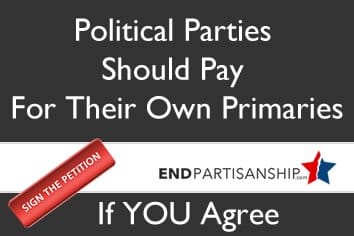Why Political Parties Hate California's Top-Two Primary

The political landscape in California has drastically shifted in recent years, with independent voters now the fastest growing group in the state. While there is still a lot of work to be done to ensure their inclusion in the political process, the passage of the nonpartisan top-two primary in 2010 has already paved the way to fairer elections in the state, as discussed in Public Policy Institute of California Improving California's Elections

"More significantly, with the open primary and the top-two runoff, the elections for most seats are no longer decided in the primary. Let me tell you, the parties hate this," Allan Zaremberg, president and CEO of the California Chamber of Commerce explains. "The parties were the ones who got it thrown out in the 1990s because it created more competition. But, for the people I think it's good. I think it's good for everybody."
His reasoning is based on voter turnout. Historically, voter turnout in primary elections is significantly lower than in general elections. In California, voter turnout for primary elections is around 25 percent, while turnout for general elections can range from 65-80 percent, depending on if it's a presidential election or not.
Prior to the nonpartisan top-two primary, the highest vote getter from each party would advance, pitting one Democrat against one Republican in the general election.
In a safe district, or a congressional district secured by one political party, the competition ends at the primary and the election is decided by a small group of primary voters from one political party.
Take Congressional District 17 in the heart of the Silicon Valley as an example. As of February 2013, 44 percent of the district's voters registered Democrat and 31.5 percent registered with No Party Preference. Given the district's tech agenda and liberal tendencies, the seat will almost certainly go to a Democrat.
In previous years, this has resulted in a guaranteed victory for Democratic Rep. Mike Honda, who has comfortably maintained his seat for almost 14 years. Winning the support of the Democratic Party meant winning the primary election, a process from which independent voters have historically been excluded.
This year, however, has resulted in what Zaremberg refers to as the cornerstone of democracy: competition.
Challenging 7-term incumbent Mike Honda is Democrat Ro Khanna.
"Silicon Valley changed the world. Now it's time for us to change Washington," reads a banner on the 37 year-old attorney's campaign website.
Honda, 71, has been successful in pushing tech policy, contributing to the America COMPETES Reauthorization Act, which passed in 2007. But, in the Silicon Valley, age matters.
“It’s not just about having a tech agenda. This is about something much deeper — our values, and our ability to use those values to change Washington and the world,” Khanna explained in a May fundraiser.
Up against the party-backed incumbent, Khanna's appeal to the Silicon Valley has already earned him over $1 million in campaign cash. In an area with the second highest wealth concentration in the United States, this Democrat versus Democrat race will likely be an expensive reminder that competition comes at a cost.
But, while intra-party competition may be costly, "it's much better to be able to have everyone involved in the electoral process and make those decisions on who gets elected," Zaremberg affirms.
Competition resulting from the top-two primary doesn't necessarily mean Mike Honda, endorsed by a long list of Democratic superstars, will lose his seat. What it does mean, however, is that he will have to appeal to a broader base in order to keep it.
For the two major parties, this means more work. For California voters, this means more choice.




